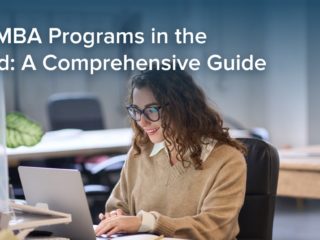| Getting your Trinity Audio player ready... |
If you’re applying for business school, you must be well-versed in MBA application requirements. There are many components for MBA applications across top programs. However, some programs have specific requirements.
In this article, we’ll discuss the most essential MBA admission requirements. This will ensure that you are ready to apply. Additionally, we’ll share examples of program-specific requirements. We’ll also discuss financial planning, common mistakes to avoid, and more.
Here are the topics we’ll cover:
- What Are the Application Qualifications for an MBA?
- What Are Program-Specific Requirements for an MBA?
- English Language Proficiency
- Financial Planning
- Application Deadlines and Processes
- Tips for a Strong Application
- Key Takeaways
- Frequently Asked Questions (FAQ)
- What’s Next?
Let’s begin by discussing the MBA application requirements.
What Are the Application Qualifications for an MBA?
Most programs have specific MBA entrance requirements. These requirements might include an undergraduate degree or equivalent, work experience, and standardized test scores. Let’s review each in detail.
Undergraduate Degree
Most –if not all – top MBA programs require an undergraduate (bachelor’s) degree or equivalent. Some bachelor’s degrees awarded outside of the U.S. take three years. However, many colleges and universities in the U.S. have four-year programs. The length of the degree program is not important, so long as it was from an accredited institution.
KEY FACT:
MBA programs require applicants to have undergraduate degrees.
Professional Experience
Many top MBA programs do not have minimums for professional experience. For example, NYU’s Stern School of Business does not require professional experience. However, many top MBA programs enroll classes with 5-6 years of work experience on average. For example, members of Fuqua’s Class of 2026 have an average of 6 years of work experience.
MBA admissions committees evaluate a candidate’s professional achievements and potential. Therefore, all types of candidates are considered. However, professional experience does not need to take place in a business setting. For example, military experience, as well as Peace Corps, and other volunteer experience, counts as professional experience.
KEY FACT:
Many MBA programs do not require a minimum number of years of work experience. However, many program cohorts average 5-6 years of professional experience.
Standardized Test Scores
Most top MBA programs require scores from the GMAT or GRE. For example, Harvard Business School and Wharton require a valid GMAT or GRE score. Additionally, some programs, like Columbia Business School, accept the Executive Assessment (EA).
There are a few top MBA programs that offer standardized test waivers. These programs include the Ross School of Business and Darden School of Business. The test waiver process varies, so you must become familiar with each program’s requirements. Additionally, test waivers are not guaranteed. If you do not meet the requirements, prepare to take the GMAT, GRE, or EA.
Finally, many top MBA programs also require international applicants to take English language proficiency tests. We’ll discuss those a little later in this article.
TTP PRO TIP:
Some MBA programs offer test waivers for qualified candidates. Review the requirements carefully and follow instructions to apply for a waiver.
Additional Requirements
In addition to work experience and standardized tests, MBA applications require a resume, essays, and short answer responses. Target Test Prep’s MBA admissions consultants will help you develop and improve these materials. Additionally, your consultant will help with your application strategy, personal branding, school selection, recommendations, and interview preparation.
Required Documents
The following documents are required to apply for top MBA programs:
- an online application
- transcripts for all degrees
- unofficial test scores
- letters of recommendation
- application fee
Once an applicant accepts an offer of admission, he or she must send additional documentation. This documentation often includes official transcripts and official test score reports.
TTP PRO TIP:
Do not wait until the last minute to request transcripts! These requests can take time to process, so submit your request early!
What Are Program-Specific Requirements for an MBA?
Business school requirements are similar across many top programs. However, applicants should be aware of program-specific requirements for standardized tests and overseas or specialty programs.
Additional Standardized Tests
Some MBA programs require standardized tests beyond the GMAT or GRE. For example, applicants who submit a GMAT Focus score to Harvard Business School must also submit a score from the GMAC Business Writing Assessment.
KEY FACT:
Harvard Business School’s writing assessment can be satisfied through the GRE, GMAT (10th edition) or English language test score.
Language Requirements
Specialty MBA programs, such as dual degrees, or overseas programs may have additional language requirements. Most top MBA programs are taught in English. However, some programs require students to know an additional language.
For example, applicants for the Wharton-Lauder program must speak another language. Applicants must score at least an “Advanced Low” rating on Wharton’s Oral Proficiency Interview.
Additionally, applicants to INSEAD’s MBA program must be fluent in English and have a minimum “practical” proficiency in a second language. INSEAD strongly recommends that students validate their second language proficiency before starting.
TTP PRO TIP:
We do not recommend that applicants “fake” a second language to gain admission to certain programs. Language competency will be tested as part of the admissions process.
English Language Proficiency
As mentioned, most top MBA programs are taught in English. Therefore, it’s critical that all students master English to communicate. Native English speakers and applicants who earned degrees at English-speaking institutions generally do not have to prove proficiency. However, candidates coming from non-English speaking countries often need to demonstrate English language proficiency.
Accepted Tests to Prove English Language Proficiency
Top MBA programs have different requirements and accept different tests. Therefore, we recommend that you become familiar with the application requirements.
For example, Stanford’s Graduate School of Business requires applicants to take an English language proficiency test if some of their graduate courses were taught in a language other than English. Stanford accepts the TOEFL, IELTS, and PTE exams.
Alternatively, the University of Chicago’s Booth School of Business requires any applicants whose native language is not English to submit a test score. Booth accepts the TOEFL, IELTS, PTE, and Duolingo English Test.
TTP PRO TIP:
Do not wait until the last minute to take your English language proficiency exam! Take it early so that you can focus on the rest of your application materials.
So far, we’ve discussed some of the application requirements across top MBA programs. Now, we’ll touch on financial planning.
Financial Planning
Financial planning is important to funding your graduate education. Additionally, some applications ask how candidates will finance their MBAs.
Exploring Ways to Fund Your MBA
As you explore MBA programs, we recommend that you carefully consider funding options. Some applicants are fully sponsored by their current employers. However, others may need scholarships and loans to finance their MBA education.
Each MBA program has a Financial Aid office providing information about financing. We recommend that you carefully review funding options for each of your target MBA programs. For example, Columbia Business School’s financial aid office outlines various funding options for applicants. Additionally, its online application features a funding calculator. To access this calculator, you must open an application for the CBS MBA program.
TTP PRO TIP:
Many MBA programs offer scholarships for candidates who apply in Round 1 and Round 2 (often the January deadline). Apply in one of these rounds to maximize your chances for earning a scholarship.
Next, let’s discuss application deadlines and processes.
Application Deadlines and Processes
Most MBA admissions committees evaluate candidates within separate time frames. These time frames are known as application “rounds.” MBA programs have 2-4 rounds each season, though some programs may have more. Admissions rounds begin in the fall (generally September) and conclude in the spring (in March or April).
Preparation Timeline
Candidates applying to top MBA programs must plan ahead. Strong MBA applications require considerable thought and planning. However, applicants should also take standardized tests before preparing other materials.
We recommend that candidates prepare for and take standardized tests 6-12 months before applying. Additionally, candidates should begin MBA applications 3-6 months before deadlines. This provides ample time to develop quality applications and improve your chances for admission.
TTP PRO TIP:
Plan to take your standardized tests 6-12 months before applying and begin your applications 3-6 months before deadlines.
Tips for a Strong Application
MBA candidates must become familiar with each of their target program’s requirements before applying.
Common Mistakes to Avoid
Common mistakes to avoid in your MBA applications include:
- Failing to read and understand the application requirements.
- Taking standardized tests at the last minute.
- Planning to take a standardized test once.
- Submitting low test scores for top programs
- Overlooking application deadlines.
- Giving too little time to recommenders.
- Trying to complete essays in a short time frame.
- Underestimating the effort it takes to create strong MBA applications.
Key Takeaways
Before beginning your MBA applications, make sure that you are familiar with:
- general MBA application requirements
- specific requirements of your target programs
- English language proficiency requirements, if applicable
- your options for funding your MBA
- the application process and deadlines for your target programs
Frequently Asked Questions (FAQ)
What is the minimum requirement for an MBA?
Most top MBA programs require an undergraduate degree and a standardized test score. Additional requirements might include an English proficiency test and a second language.
What GPA do you need for an MBA?
There is no minimum GPA requirement for top MBA programs. In other words, the MBA GPA requirements are flexible. However, students in competitive MBA programs have high average GPAs. A great standardized test score can help to offset a low GPA.
What are the requirements for an MBA degree?
The MBA degree requirements vary by program. We recommend reviewing the admissions criteria carefully for each of your target programs.
What are the requirements for an MBA in the USA?
The U.S. MBA requirements are similar to those of other programs. Most top MBA programs in the U.S. require applicants to have an undergraduate degree, and some require standardized tests. However, most do not require additional languages. Additionally, most programs do not have specific MBA course requirements.
How do you apply for an MBA?
Read the instructions carefully for each of your target programs. Then, review the best practices outlined in this article. Make sure you have enough time to prepare for and take the GMAT, GRE, or EA. Work with one of Target Test Prep’s experienced MBA admissions consultants to put your best foot forward in the MBA application process.
What’s Next?
It’s not easy to create a competitive application for top MBA applications, but we can help! Target Test Prep’s experienced MBA admissions consultants will help you create an exceptional application package.



